115 Shadow Work Prompts | Deep Shadow Work Questions
Shadow work prompts serve as guiding beacons, illuminating the hidden corners of our psyche and inviting us to confront and embrace our lesser-seen aspects.
In this blog post, I delve into the art of introspection through carefully curated shadow work journal prompts designed for beginners and experienced practitioners alike.
From nurturing your inner child to fostering self-love, healing trauma, and manifesting your deepest desires, each prompt is a step towards profound self-discovery and healing.
Embarking on this journey is no small feat, and I commend you for the courage to explore the deeper, darker, and less traversed aspects of your being. It’s akin to mining the soul, where amidst the shadows, we often discover hidden treasures—untapped strengths and insights that can profoundly transform our lives.
So, grab your journal, find a cozy nook, and let’s explore the rich tapestry of your inner world through these free shadow work questions.
1. Beginning the Journey: Shadow Work Prompts for Beginners
Becoming aware of your shadow self can be quite challenging. For deep shadow work it’s ideal to work with a Jungian Analyst so you can be guided in this journey of self-discovery and integration.
Nonetheless, the right shadow work journaling prompts can help you get started. In this section, I present some of the best shadow work exercises specifically tailored for those beginning their journey.
These prompts are designed to gently guide you through the initial stages of self-exploration, helping you to uncover and understand the more concealed parts of your psyche.
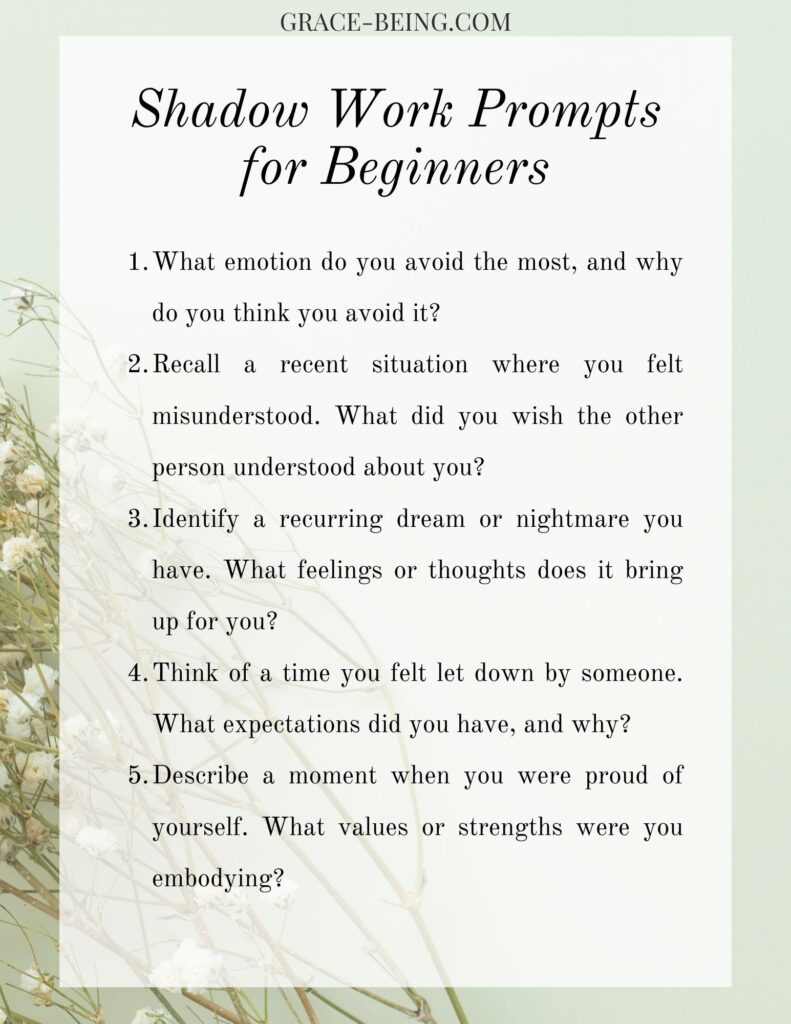
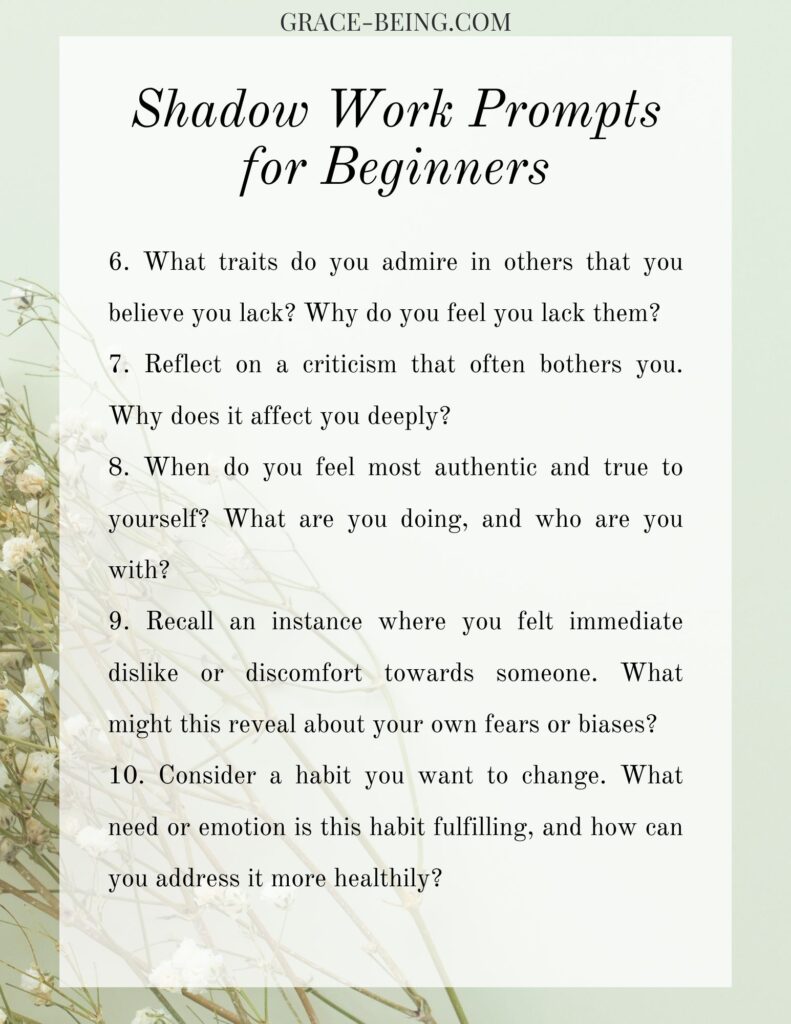
- What emotion do you avoid the most, and why do you think you avoid it?
- Recall a recent situation where you felt misunderstood. What did you wish the other person understood about you?
- Identify a recurring dream or nightmare you have. What feelings or thoughts does it bring up for you?
- Think of a time you felt let down by someone. What expectations did you have, and why?
- Describe a moment when you were proud of yourself. What values or strengths were you embodying?
- What traits do you admire in others that you believe you lack? Why do you feel you lack them?
- Reflect on a criticism that often bothers you. Why does it affect you deeply?
- When do you feel most authentic and true to yourself? What are you doing, and who are you with?
- Recall an instance where you felt immediate dislike or discomfort towards someone. What might this reveal about your own fears or biases?
- Consider a habit you want to change. What need or emotion is this habit fulfilling, and how can you address it more healthily?
2. Healing from Within: Shadow Work Prompts for Healing
When you start doing the inner work, a crucial aspect of healing involves acknowledging and integrating your shadow.
Healing isn’t about eliminating the shadow, it’s about illuminating it and fostering compassion, love, understanding, and acceptance towards these concealed facets of our being.
This process is akin to emotional alchemy, where we transform the dense, heavy emotions of anger, lust, fear, jealousy, rage, shame, and others, into invaluable sources of strength and wisdom.
Through this alchemical transformation, our shadows become our allies, guiding us toward profound healing and growth.
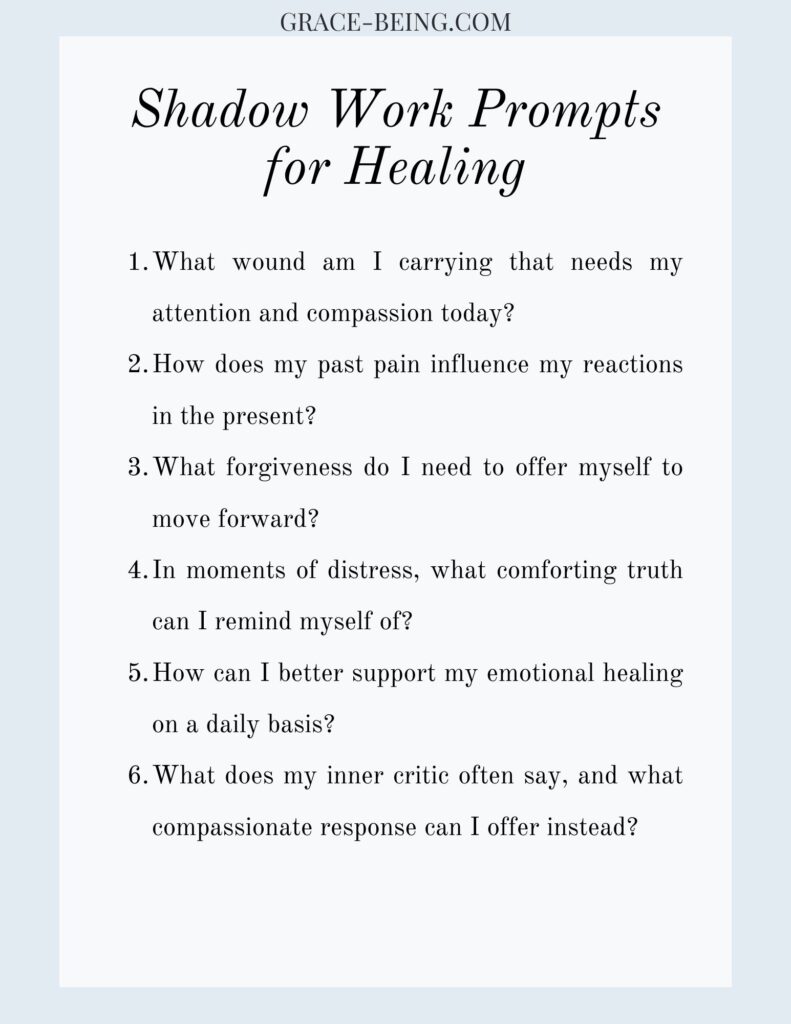
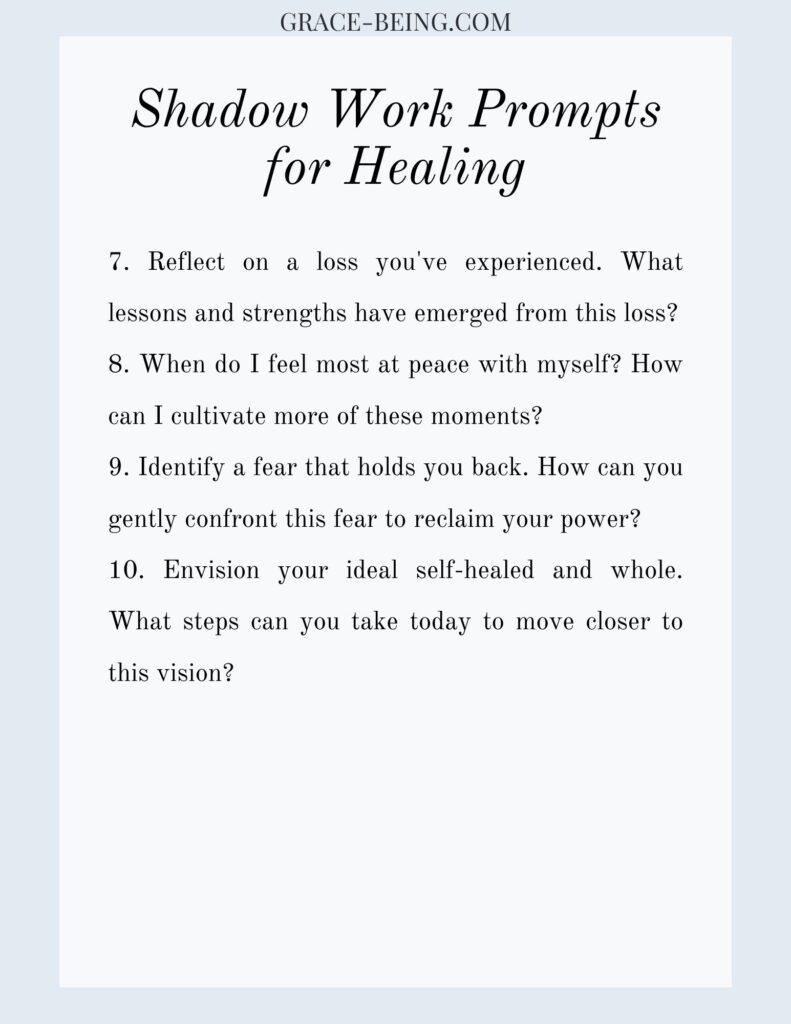
- What wound am I carrying that needs my attention and compassion today?
- How does my past pain influence my reactions in the present?
- What forgiveness do I need to offer myself to move forward?
- In moments of distress, what comforting truth can I remind myself of?
- How can I better support my emotional healing on a daily basis?
- What does my inner critic often say, and what compassionate response can I offer instead?
- Reflect on a loss you’ve experienced. What lessons and strengths have emerged from this loss?
- When do I feel most at peace with myself? How can I cultivate more of these moments?
- Identify a fear that holds you back. How can you gently confront this fear to reclaim your power?
- Envision your ideal self-healed and whole. What steps can you take today to move closer to this vision?
3. Reconnecting with Your Inner Child: Inner Child Shadow Work Prompts
Revisiting the realms of our youth with shadow work prompts to heal the inner child can unearth profound insights.
These deep shadow work prompts are designed to bridge the gap between your adult self and your inner child, fostering a healing reunion and a nurturing understanding.
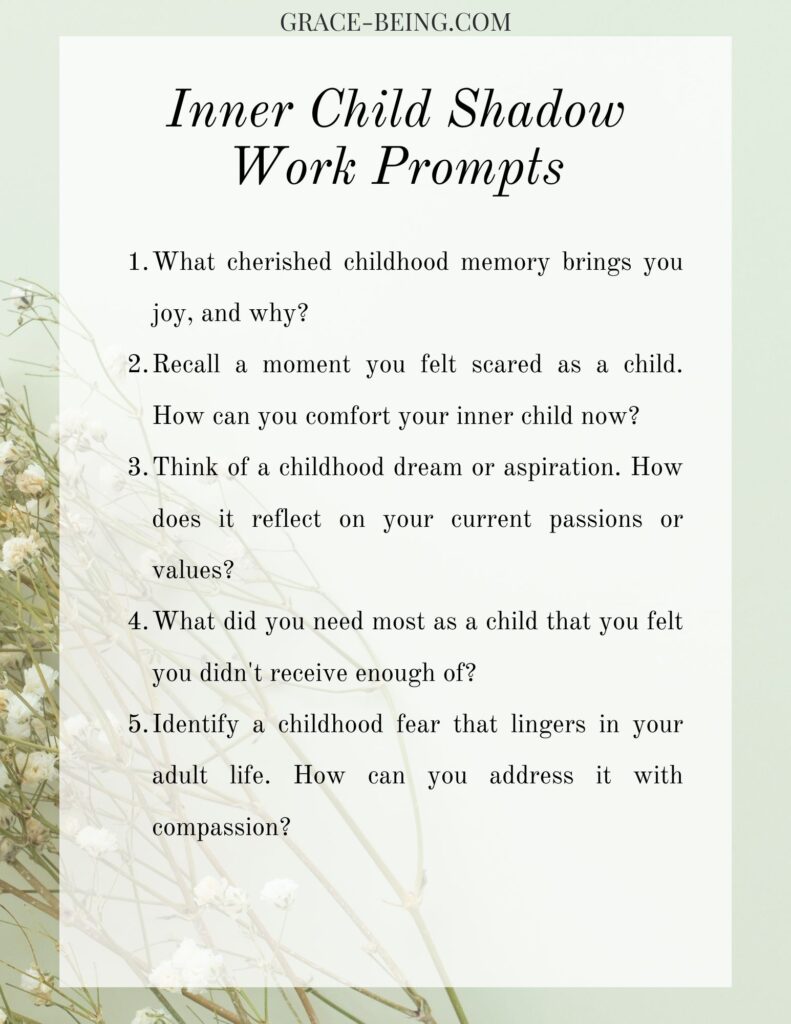
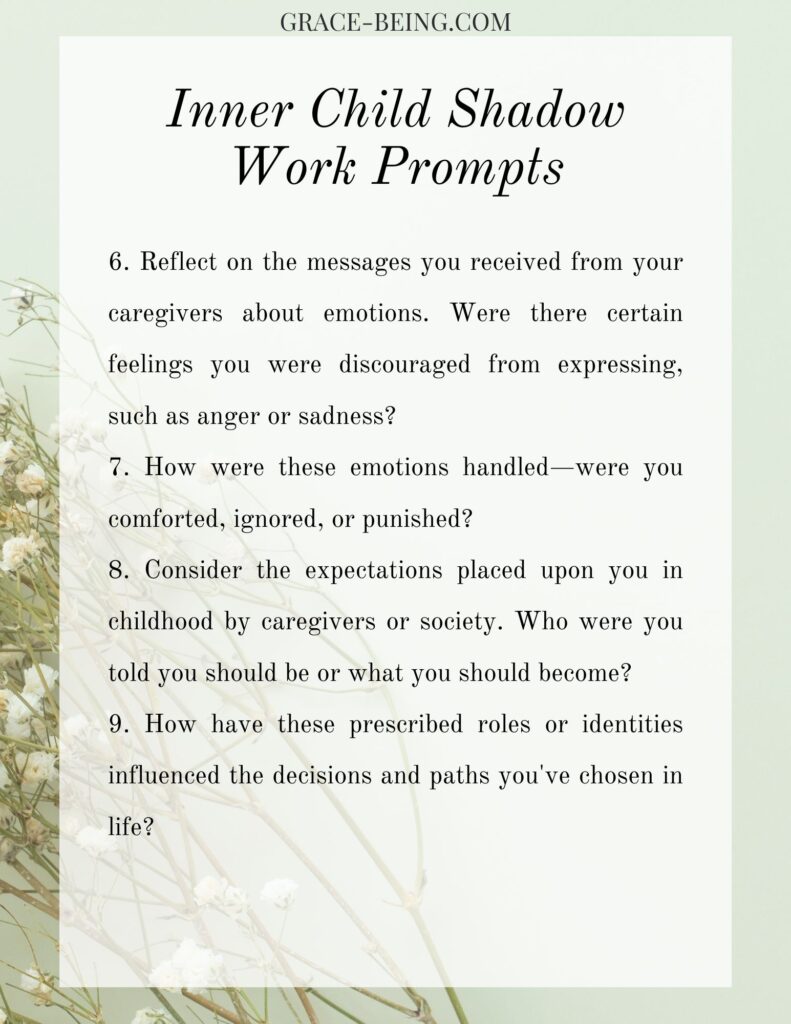
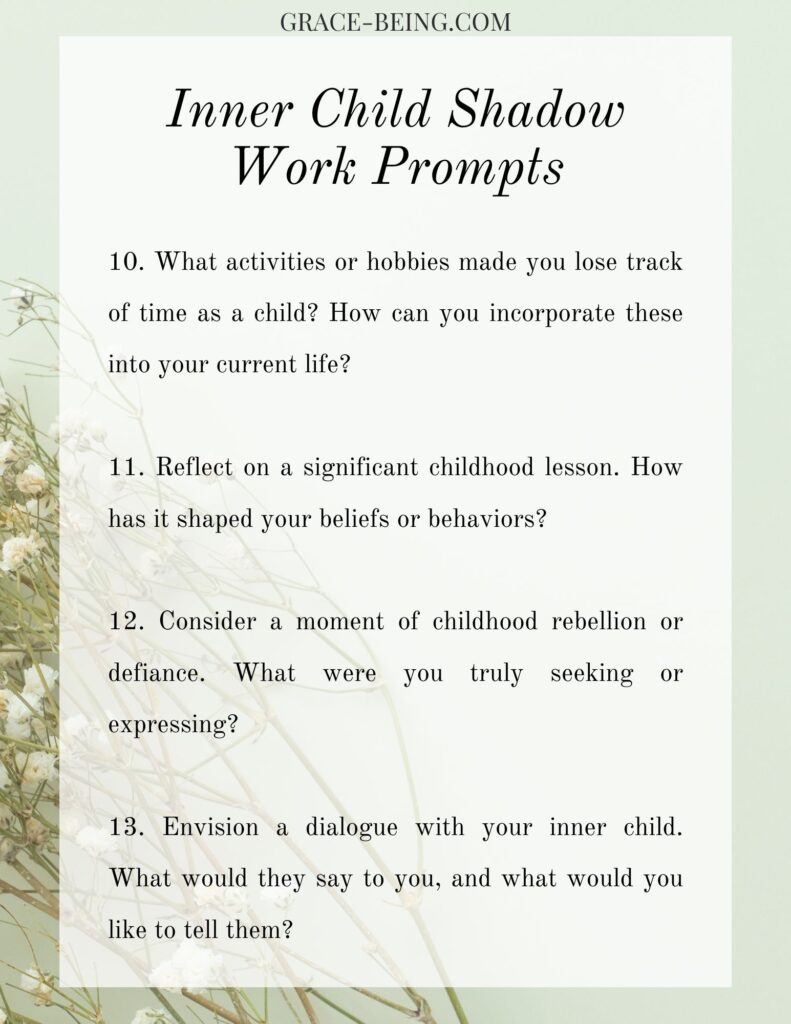
- What cherished childhood memory brings you joy, and why?
- Recall a moment you felt scared as a child. How can you comfort your inner child now?
- Think of a childhood dream or aspiration. How does it reflect on your current passions or values?
- What did you need most as a child that you felt you didn’t receive enough of?
- Identify a childhood fear that lingers in your adult life. How can you address it with compassion?
- Reflect on the messages you received from your caregivers about emotions. Were there certain feelings you were discouraged from expressing, such as anger or sadness?
- How were these emotions handled—were you comforted, ignored, or punished?
- Consider the expectations placed upon you in childhood by caregivers or society. Who were you told you should be or what you should become?
- How have these prescribed roles or identities influenced the decisions and paths you’ve chosen in life?
- What activities or hobbies made you lose track of time as a child? How can you incorporate these into your current life?
- Reflect on a significant childhood lesson. How has it shaped your beliefs or behaviors?
- Consider a moment of childhood rebellion or defiance. What were you truly seeking or expressing?
- Envision a dialogue with your inner child. What would they say to you, and what would you like to tell them?
4. Cultivating Deeper Connections: Shadow Work Prompts for Relationships
Shadow work in relationships unveils the profound truth that what often triggers us in our partners can mirror aspects of our own shadow selves.
By acknowledging and understanding these projections, we open the door to cultivating deeper, more authentic connections with others and with ourselves.
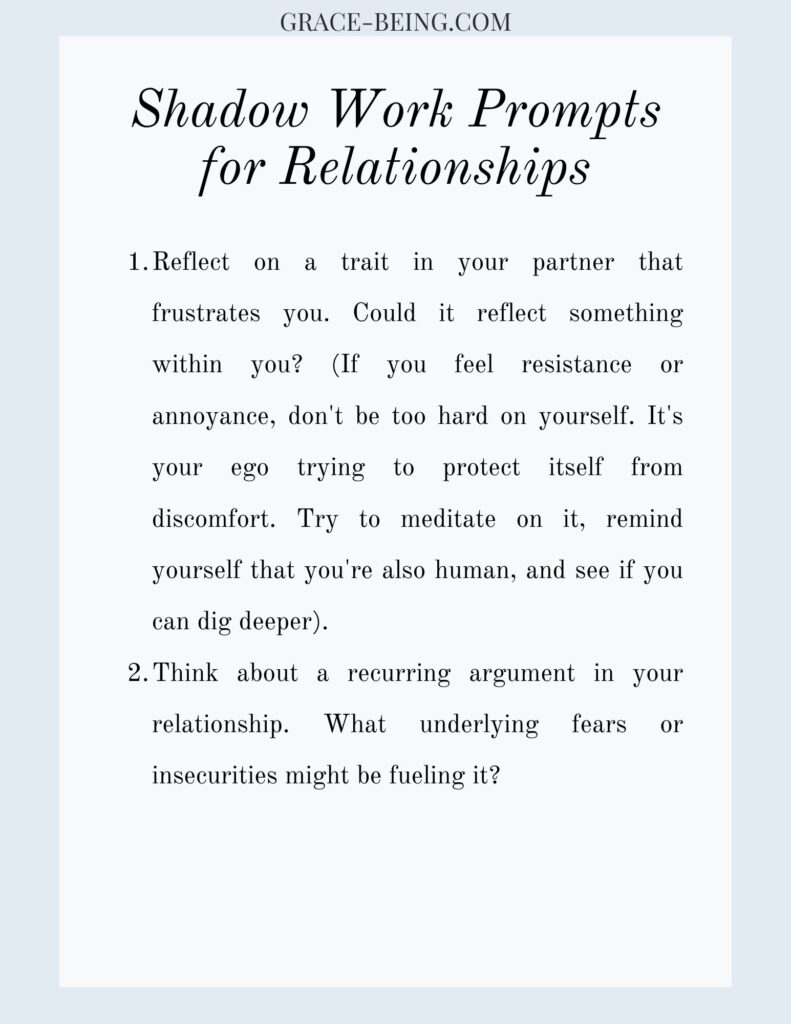

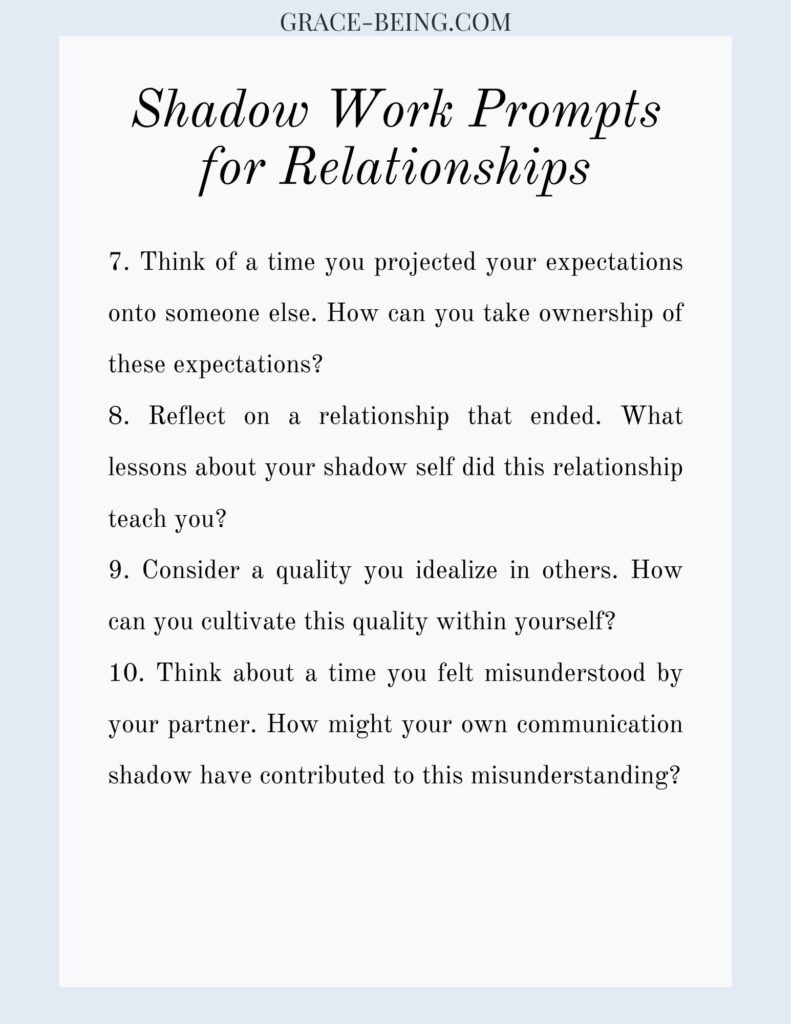
- Reflect on a trait in your partner that frustrates you. Could it reflect something within you? (If you feel resistance or annoyance, don’t be too hard on yourself. It’s your ego trying to protect itself from discomfort. Try to meditate on it, remind yourself that you’re also human, and see if you can dig deeper).
- Think about a recurring argument in your relationship. What underlying fears or insecurities might be fueling it?
- Recall a moment you felt deeply hurt by someone’s words or actions. What part of your shadow felt threatened?
- Consider a time you were quick to judge someone close to you. What does this judgment reveal about your own values or insecurities?
- Identify a situation where you felt jealous or envious in a relationship. What does this emotion say about your desires or self-worth?
- Remember a moment you felt unsupported by your partner. How can you fulfill this need for yourself?
- Think of a time you projected your expectations onto someone else. How can you take ownership of these expectations?
- Reflect on a relationship that ended. What lessons about your shadow self did this relationship teach you?
- Consider a quality you idealize in others. How can you cultivate this quality within yourself?
- Think about a time you felt misunderstood by your partner. How might your own communication shadow have contributed to this misunderstanding?
5. Shadow Work Prompts for Relationship Trauma
As someone who has endured the profound challenges of relationship trauma, I understand firsthand the transformative power of shadow work in the healing process.
These shadow work journal prompts are not just exercises, they are a passage towards healing, offering a path to explore and reconcile the impact of past traumas.
Engaging in this reflective practice can significantly improve your relationship with yourself and others, lifting your spirit by releasing the heavy emotional baggage resulting from the trauma.
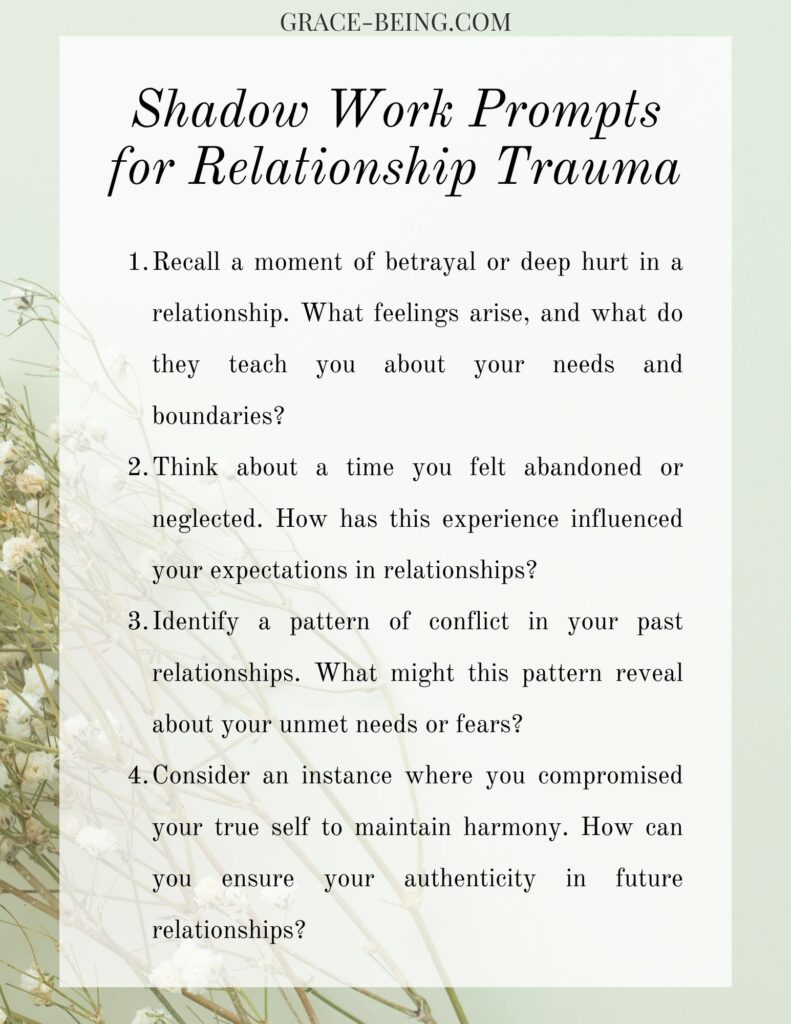
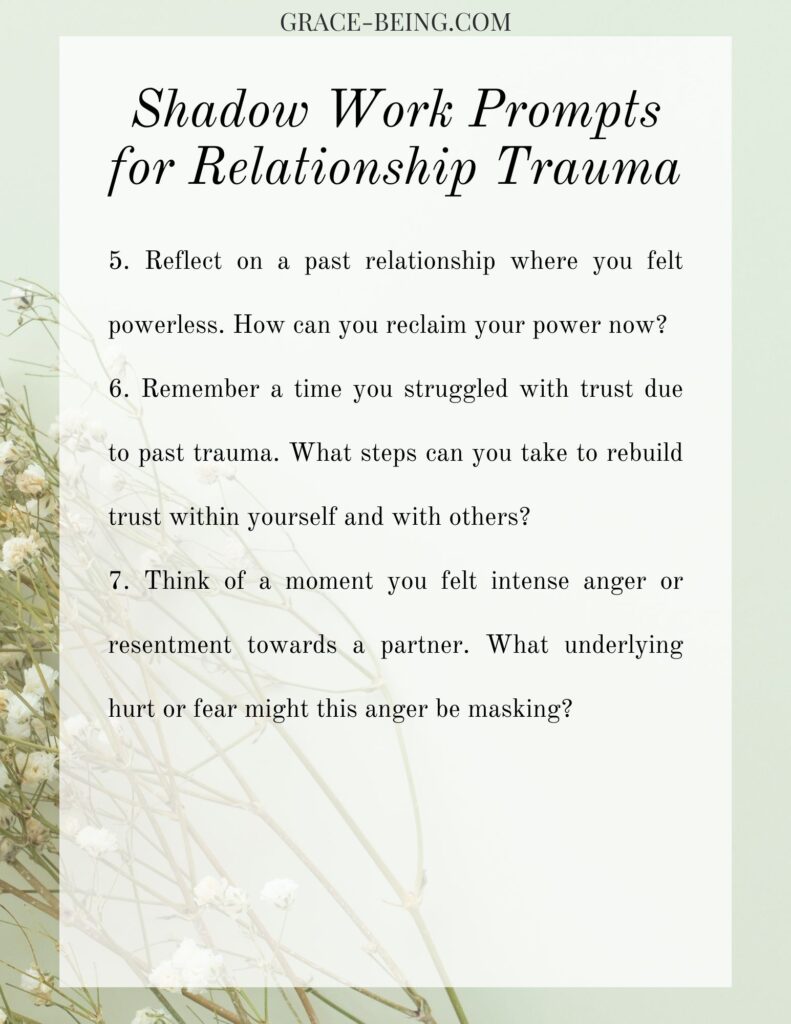
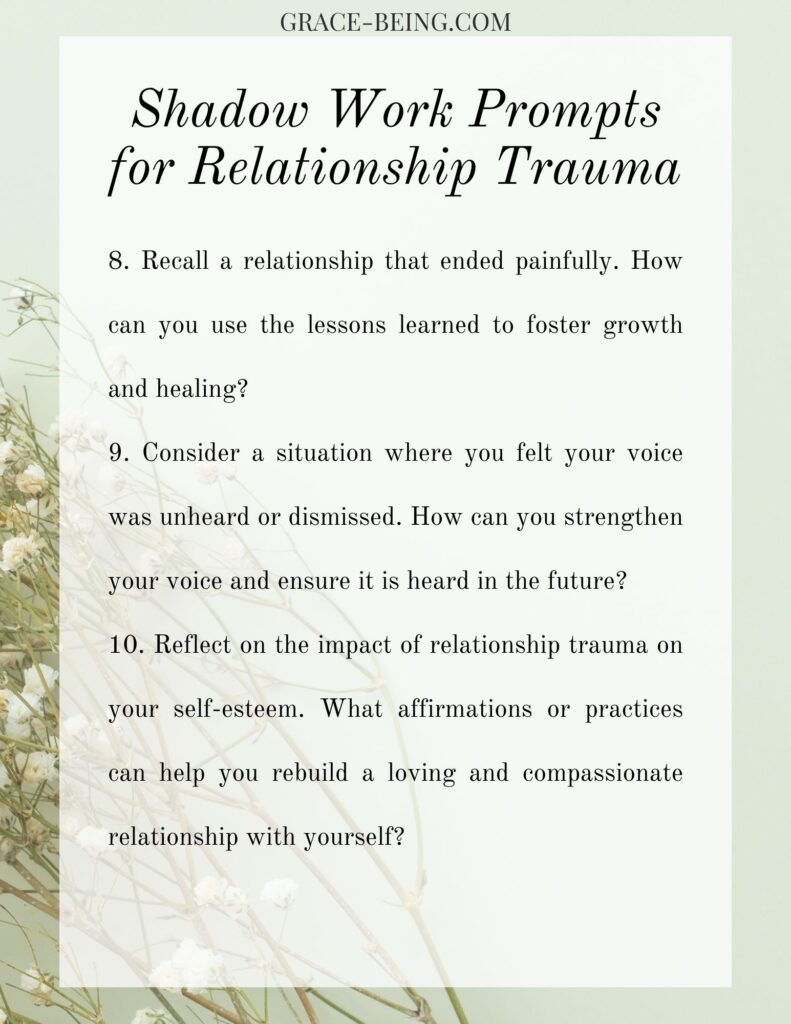
- Recall a moment of betrayal or deep hurt in a relationship. What feelings arise, and what do they teach you about your needs and boundaries?
- Think about a time you felt abandoned or neglected. How has this experience influenced your expectations in relationships?
- Identify a pattern of conflict in your past relationships. What might this pattern reveal about your unmet needs or fears?
- Consider an instance where you compromised your true self to maintain harmony. How can you ensure your authenticity in future relationships?
- Reflect on a past relationship where you felt powerless. How can you reclaim your power now?
- Remember a time you struggled with trust due to past trauma. What steps can you take to rebuild trust within yourself and with others?
- Think of a moment you felt intense anger or resentment towards a partner. What underlying hurt or fear might this anger be masking?
- Recall a relationship that ended painfully. How can you use the lessons learned to foster growth and healing?
- Consider a situation where you felt your voice was unheard or dismissed. How can you strengthen your voice and ensure it is heard in the future?
- Reflect on the impact of relationship trauma on your self-esteem. What affirmations or practices can help you rebuild a loving and compassionate relationship with yourself?
6. Transforming Pain into Power: Shadow Work Prompts for Trauma
Dr. Gabor Maté, one of my favorite experts on trauma, has profoundly influenced my approach to integrating traumatic experiences.
His perspective has been enlightening as he emphasizes the internal impact of trauma, rather than external events.
This has helped me transform my narrative and cultivate a deeper sense of self-compassion and understanding.
Here are 10 shadow work journaling prompts inspired by his teachings:
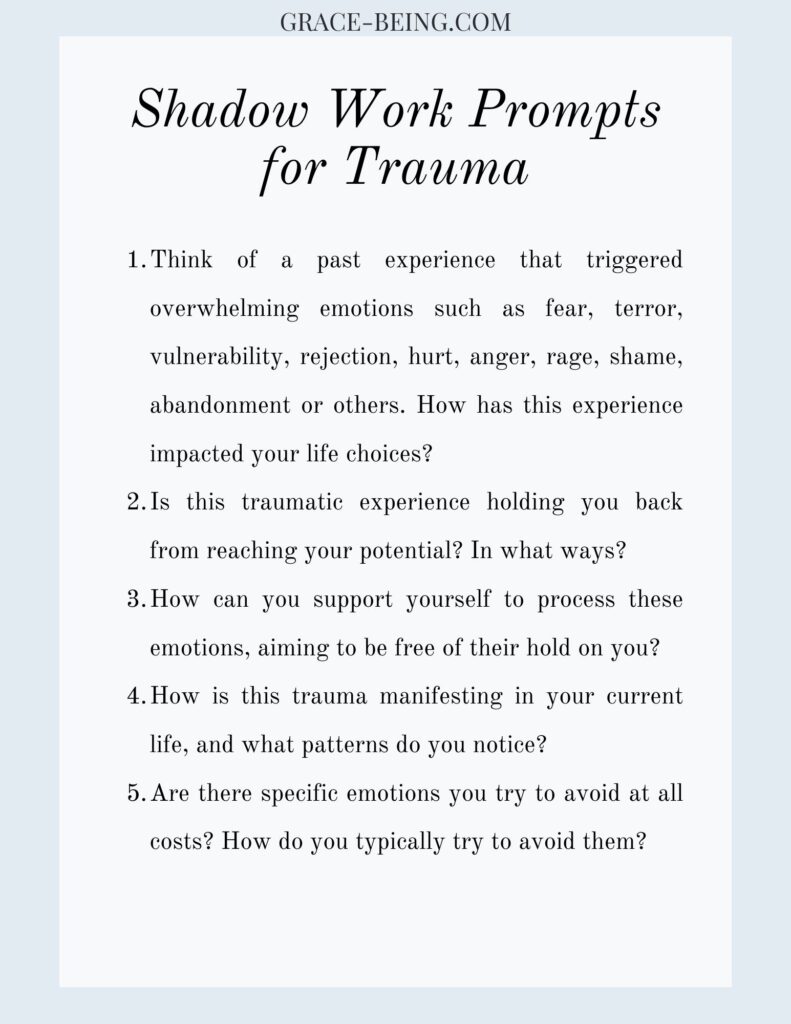
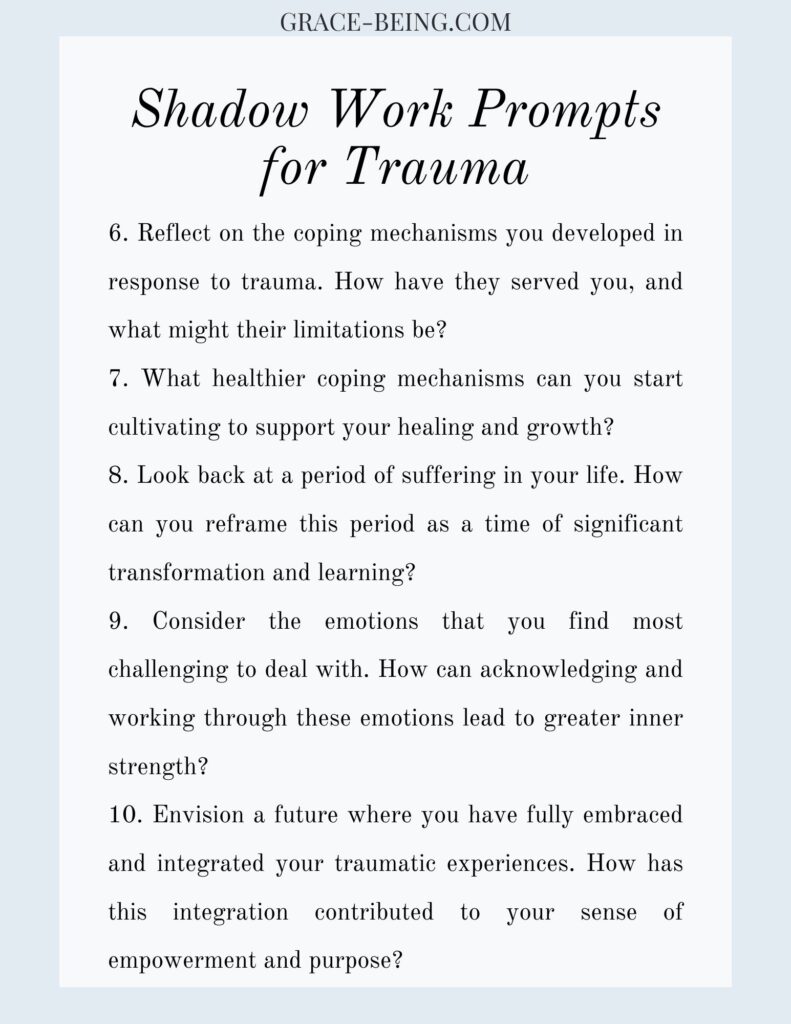
- Think of a past experience that triggered overwhelming emotions such as fear, terror, vulnerability, rejection, hurt, anger, rage, shame, abandonment or others. How has this experience impacted your life choices?
- Is this traumatic experience holding you back from reaching your potential? In what ways?
- How can you support yourself to process these emotions, aiming to be free of their hold on you?
- How is this trauma manifesting in your current life, and what patterns do you notice?
- Are there specific emotions you try to avoid at all costs? How do you typically try to avoid them?
- Reflect on the coping mechanisms you developed in response to trauma. How have they served you, and what might their limitations be?
- What healthier coping mechanisms can you start cultivating to support your healing and growth?
- Look back at a period of suffering in your life. How can you reframe this period as a time of significant transformation and learning?
- Consider the emotions that you find most challenging to deal with. How can acknowledging and working through these emotions lead to greater inner strength?
- Envision a future where you have fully embraced and integrated your traumatic experiences. How has this integration contributed to your sense of empowerment and purpose?
7. Embracing Self-Compassion: Shadow Work Prompts for Self Love
The narratives we weave about ourselves often mirror the hidden contours of our shadow selves.
Often, these narratives are tinged with criticism, lack support, and can hinder our journey towards self-love.
By engaging with these shadow work journal prompts, you can uncover and transform these underlying beliefs, paving the way for a more nurturing and empowering self-dialogue.
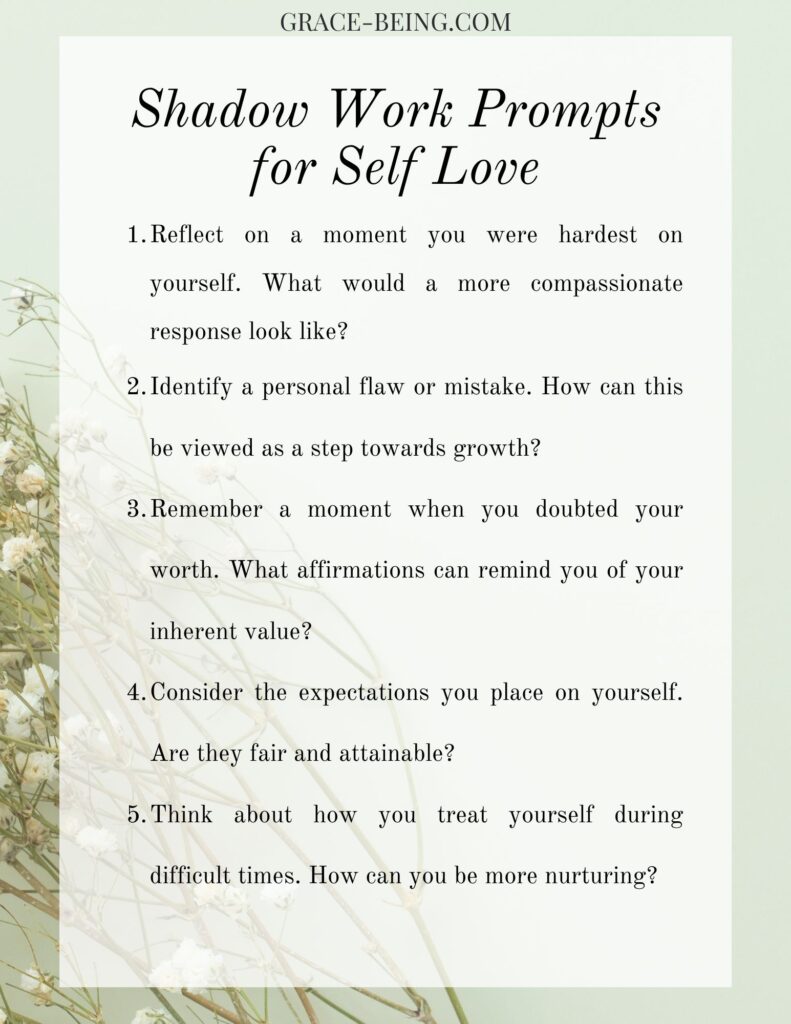
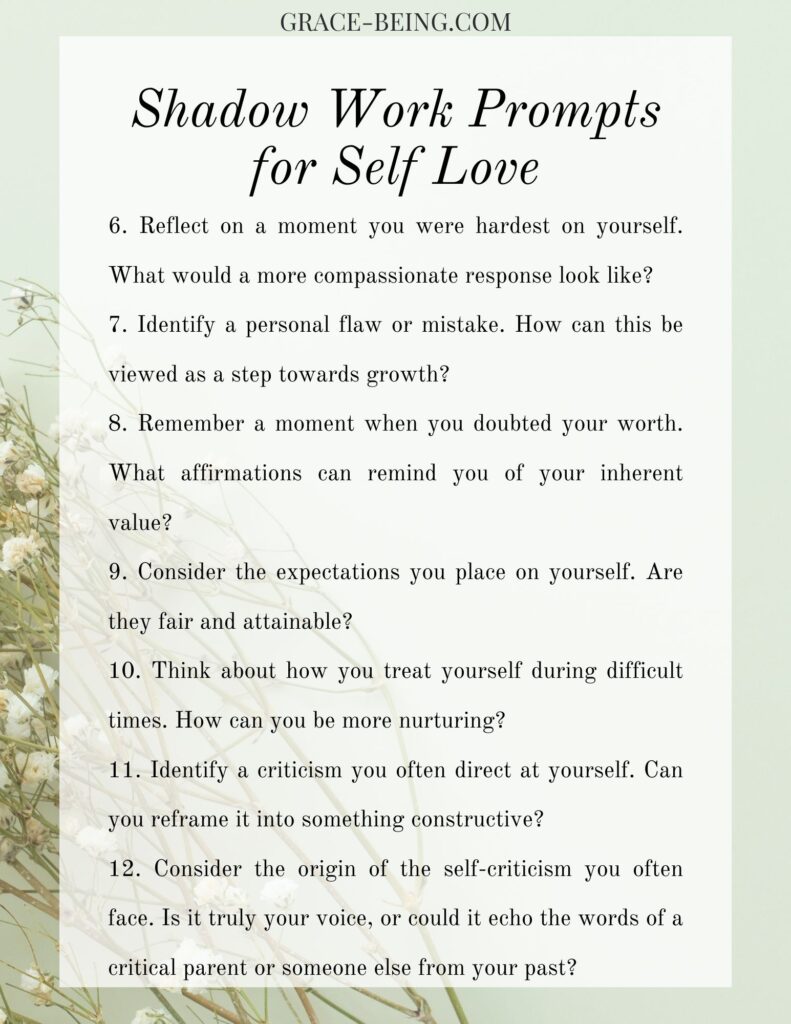
- Reflect on a moment you were hardest on yourself. What would a more compassionate response look like?
- Identify a personal flaw or mistake. How can this be viewed as a step towards growth?
- Remember a moment when you doubted your worth. What affirmations can remind you of your inherent value?
- Consider the expectations you place on yourself. Are they fair and attainable?
- Think about how you treat yourself during difficult times. How can you be more nurturing?
- Identify a criticism you often direct at yourself. Can you reframe it into something constructive?
- Consider the origin of the self-criticism you often face. Is it truly your voice, or could it echo the words of a critical parent or someone else from your past?
- Reflect on your self-care practices. How can you enhance them to better support your well-being?
- Recall a moment of self-doubt. How can you reassure and affirm your capabilities?
- Consider the boundaries you set with others. How do they reflect your self-respect and love?
- Think about a time you compared yourself to others. How can you shift focus to your unique journey and strengths?
- Reflect on the story or narrative you frequently tell yourself about your life. Is it empowering and supportive? If not, how can you rewrite it to foster a more positive, loving and encouraging self-view?
8. Manifesting Your Desires: Shadow Work Prompts for Manifestation
When we aim to bring our desires to life, we sometimes run into hidden obstacles. These are often caused by emotions and beliefs we haven’t fully addressed, tucked away in our subconscious.
It’s essential to align our inner world and find coherence. Otherwise, we might face inner conflicts and resistance that can slow us down.
Dreams can act as windows into these hidden blockages. Working with a Jungian analyst has been a game-changer for me. Their expertise in dream interpretation has pushed my manifestations forward. It helped me move beyond a standstill in my hero’s journey.
Utilizing shadow work journal prompts can help spotlight and tackle these hidden hurdles, clearing the path towards achieving your goals.
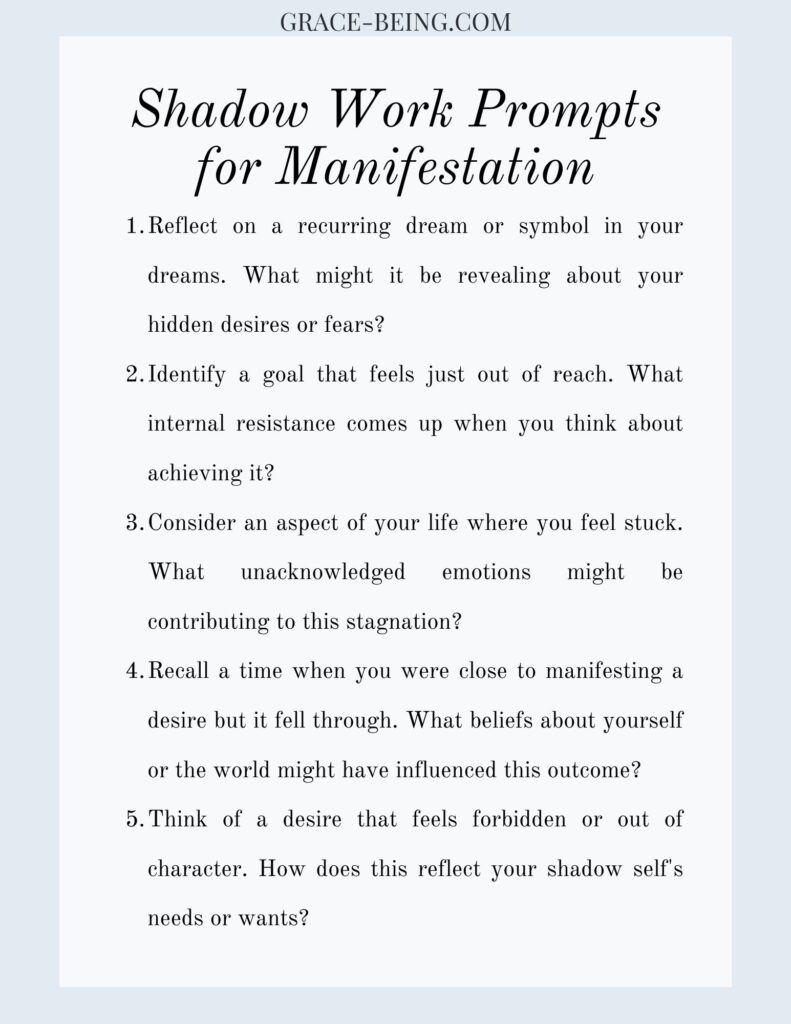
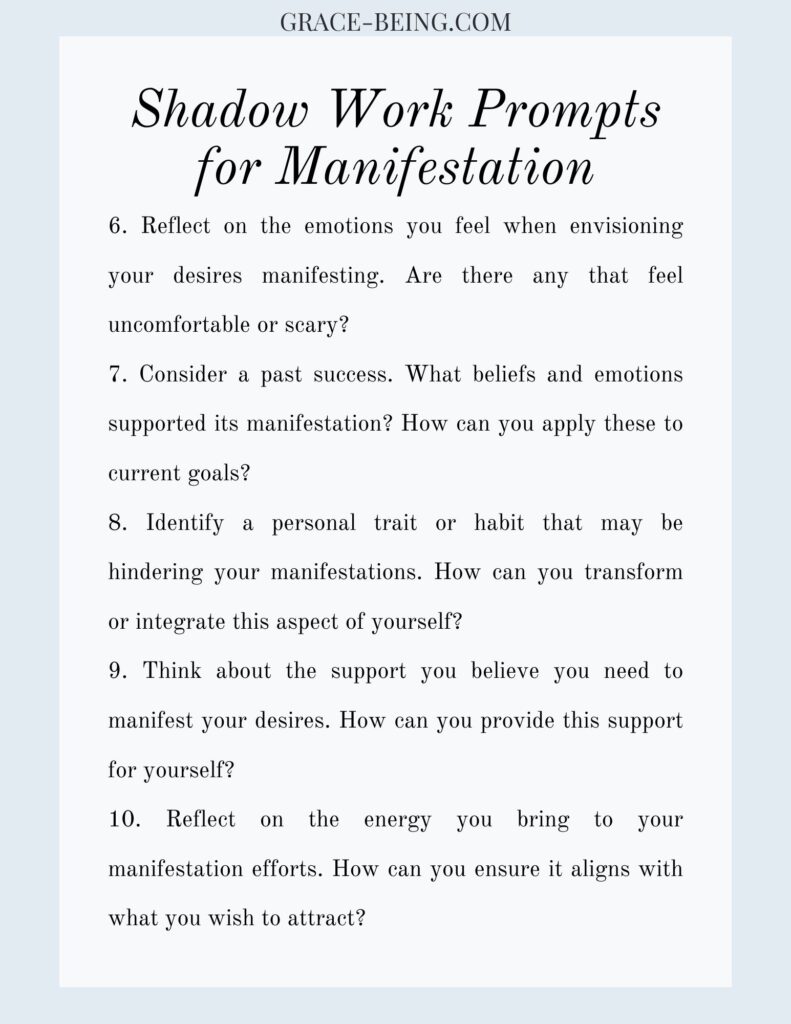
- Reflect on a recurring dream or symbol in your dreams. What might it be revealing about your hidden desires or fears?
- Identify a goal that feels just out of reach. What internal resistance comes up when you think about achieving it?
- Consider an aspect of your life where you feel stuck. What unacknowledged emotions might be contributing to this stagnation?
- Recall a time when you were close to manifesting a desire but it fell through. What beliefs about yourself or the world might have influenced this outcome?
- Think of a desire that feels forbidden or out of character. How does this reflect your shadow self’s needs or wants?
- Reflect on the emotions you feel when envisioning your desires manifesting. Are there any that feel uncomfortable or scary?
- Consider a past success. What beliefs and emotions supported its manifestation? How can you apply these to current goals?
- Identify a personal trait or habit that may be hindering your manifestations. How can you transform or integrate this aspect of yourself?
- Think about the support you believe you need to manifest your desires. How can you provide this support for yourself?
- Reflect on the energy you bring to your manifestation efforts. How can you ensure it aligns with what you wish to attract?
9. Unveiling the Authentic You: Shadow Work Prompts for Self Discovery
Getting to know your shadow self is crucial for deep self-discovery. Without this exploration, our understanding of ourselves remains superficial.
By bringing these unconscious aspects to light, we journey towards a more complete sense of self.
This process of integration heals fragmented parts of our psyche, fostering inner harmony and a more authentic connection with our true selves.
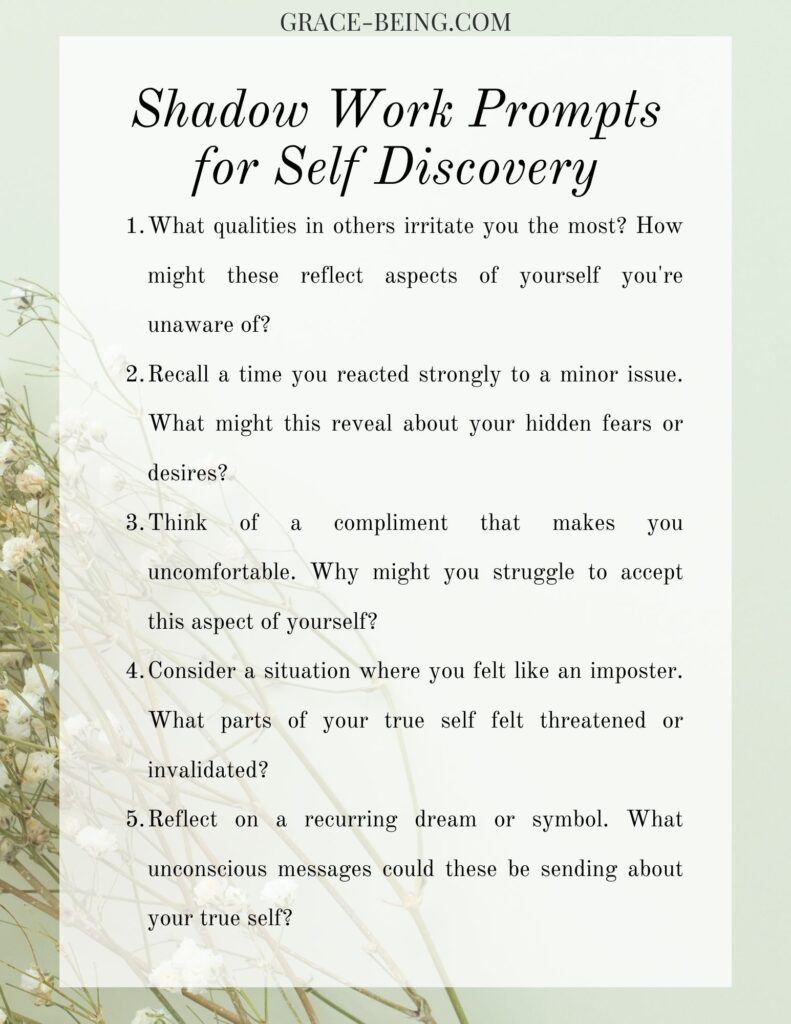
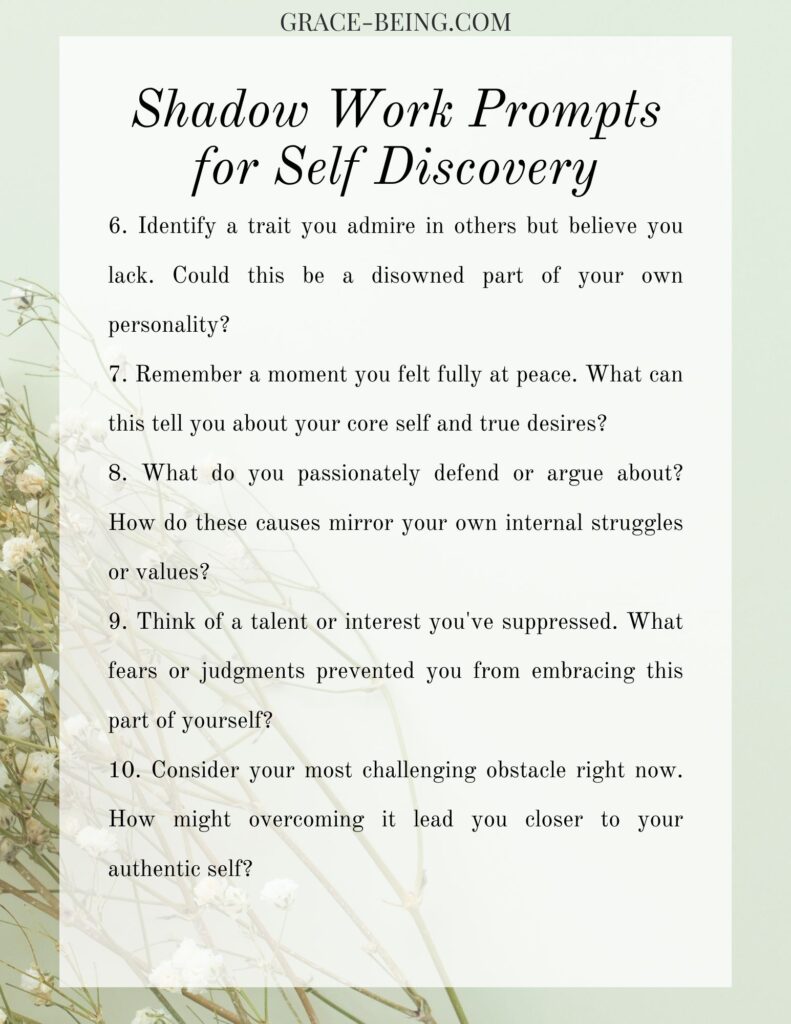
- What qualities in others irritate you the most? How might these reflect aspects of yourself you’re unaware of?
- Recall a time you reacted strongly to a minor issue. What might this reveal about your hidden fears or desires?
- Think of a compliment that makes you uncomfortable. Why might you struggle to accept this aspect of yourself?
- Consider a situation where you felt like an imposter. What parts of your true self felt threatened or invalidated?
- Reflect on a recurring dream or symbol. What unconscious messages could these be sending about your true self?
- Identify a trait you admire in others but believe you lack. Could this be a disowned part of your own personality?
- Remember a moment you felt fully at peace. What can this tell you about your core self and true desires?
- What do you passionately defend or argue about? How do these causes mirror your own internal struggles or values?
- Think of a talent or interest you’ve suppressed. What fears or judgments prevented you from embracing this part of yourself?
- Consider your most challenging obstacle right now. How might overcoming it lead you closer to your authentic self?
10. Navigating the Storms of Anger: Anger Shadow Work Prompts
Anger is a fundamental human emotion that serves as a signal, alerting us to crossed boundaries, unmet needs, and ways we might be neglecting or abandoning ourselves.
Often, we’re taught as children that expressing anger is not acceptable, or we might learn to gloss over our true feelings to maintain peace, even when wronged.
However, embracing anger as a valid emotion is crucial. It’s not about aggression but understanding that anger’s energy can be channeled constructively.
It can empower us to assert ourselves, articulate our needs, express our feelings, and establish boundaries. The key lies not in acting out in anger but in using it to enhance our conscious actions and decisions.
Understanding the root of our anger is essential, as it often masks deeper issues or unresolved conflicts. By unraveling these layers, we gain profound insights into our true grievances and how to address them constructively.
With this understanding, let’s explore the following anger shadow work prompts to delve deeper into our relationship with anger and harness its transformative power.
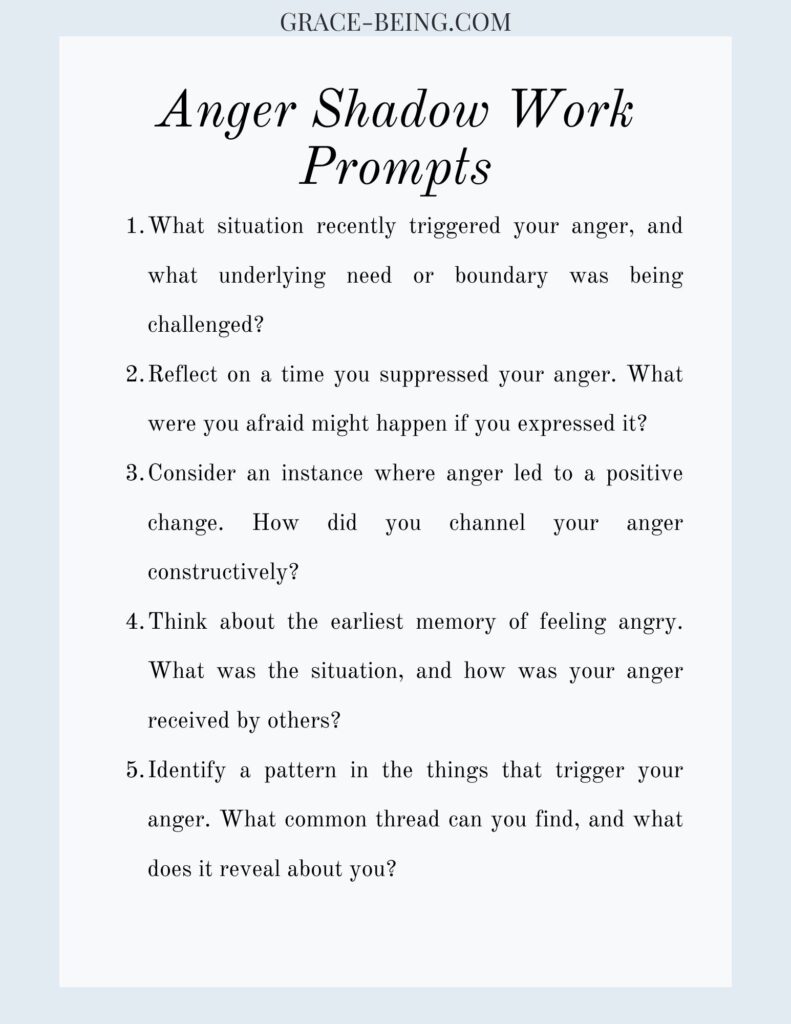
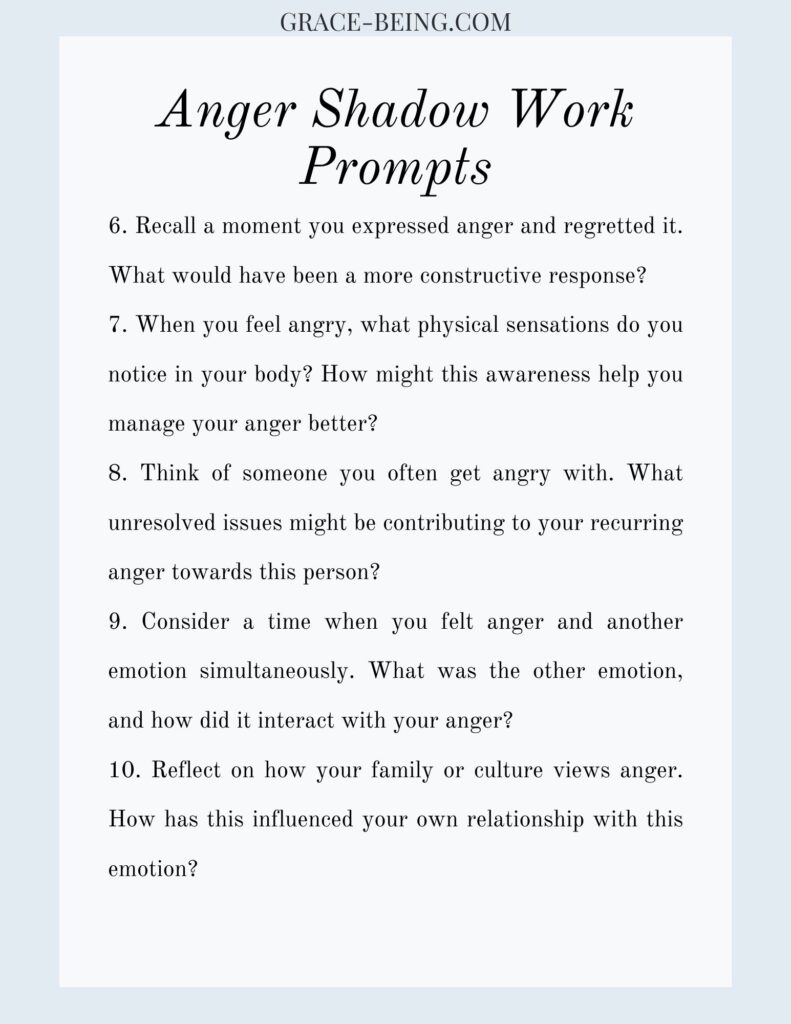
- What situation recently triggered your anger, and what underlying need or boundary was being challenged?
- Reflect on a time you suppressed your anger. What were you afraid might happen if you expressed it?
- Consider an instance where anger led to a positive change. How did you channel your anger constructively?
- Think about the earliest memory of feeling angry. What was the situation, and how was your anger received by others?
- Identify a pattern in the things that trigger your anger. What common thread can you find, and what does it reveal about you?
- Recall a moment you expressed anger and regretted it. What would have been a more constructive response?
- When you feel angry, what physical sensations do you notice in your body? How might this awareness help you manage your anger better?
- Think of someone you often get angry with. What unresolved issues might be contributing to your recurring anger towards this person?
- Consider a time when you felt anger and another emotion simultaneously. What was the other emotion, and how did it interact with your anger?
- Reflect on how your family or culture views anger. How has this influenced your own relationship with this emotion?
11. Chakra Shadow Work Prompts: Aligning Your Energy Centers
Exploring the chakras through shadow work questions offers a unique lens for self-discovery, revealing how our energy centers can hold unresolved emotions and experiences.
By aligning and balancing these chakras, we can address deep-seated blockages, promoting harmony and well-being.
Let’s dive into these chakra-based shadow work prompts to uncover and heal these hidden aspects.


- Root Chakra: Reflect on your sense of security and belonging. Where do you feel most grounded, and where do you not?
- Sacral Chakra: Consider your relationship with pleasure and creativity. What blocks you from expressing these freely?
- Solar Plexus Chakra: Think about your self-esteem and personal power. When do you feel most confident, and when do you doubt yourself?
- Heart Chakra: Examine your capacity for love and forgiveness. Is there a grudge or hurt you’re holding onto that needs healing?
- Throat Chakra: Look at your communication and self-expression. Are there truths you’re afraid to speak out loud?
- Third Eye Chakra: Delve into your intuition and wisdom. What inner knowledge are you ignoring or dismissing?
- Crown Chakra: Reflect on your spiritual connection and consciousness. Do you feel disconnected from your higher self or purpose?
- Reflect on the energy flow between your chakras. Where do you sense imbalances or blockages?
- Consider any physical symptoms that correlate with imbalanced chakras. What might these be signaling about your emotional or spiritual health?
- Envision your chakras fully aligned and in harmony. How would this state of balance manifest in your daily life?
For more insights on Carl Jung’s work, explore these related resources:
Carl Jung & Religion: Exploring Jung’s Perspective on God
Is Shadow Work Dangerous?
FAQs on Shadow Work Prompts & Questions
Many therapists view shadow work prompts and journaling as valuable tools for self-reflection and personal growth. They can complement therapeutic practices by encouraging deeper introspection and emotional processing.
No, shadow work encompasses more than just journaling. It includes various practices like meditation, therapy, and creative expression, aiming to integrate all parts of the self.
The frequency of shadow work varies per individual. Some may find daily journaling beneficial, while others might engage in deeper practices weekly or monthly. Listen to your needs and proceed accordingly.
If not approached with care, shadow work can be overwhelming. It’s essential to proceed gently and seek professional support if facing intense emotions or trauma.






